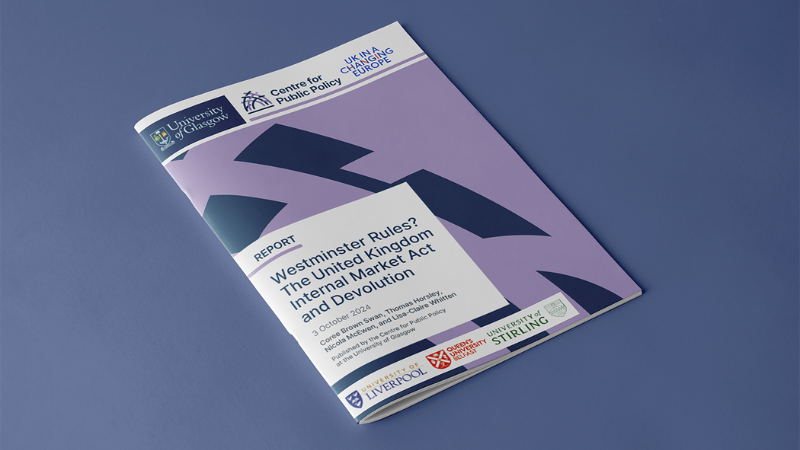Report: Westminster Rules? United Kingdom Internal Market Act and Devolution
Published: 2 October 2024
This impartial analysis of the context, content and operational impact of the UKIMA brings together leading academics from the Universities of Glasgow, Liverpool, Stirling and Queens University Belfast and offers pragmatic policy ideas that could lead to a new, more consensual way forward.
Read the report: Report: Westminster Rules: The United Kingdom Internal Market Act and Devolution
As we mark the 25th anniversary of devolution, this research reflects on the most significant legislation impacting devolved governments— the United Kingdom Internal Market Act (UKIMA). Enacted in December 2020, authors argue UKIMA has undermined the authority and status of the devolved institutions and contributed to the erosion of intergovernmental trust.
While the Act aims to ensure frictionless trade within the UK post-Brexit, it has been viewed as antagonistic to devolution, diminishing the authority of governments in Scotland, Wales, and Northern Ireland. The exclusions process for deviating from UKIMA’s market access rules lacks transparency and often allows the UK Government to override devolved decisions, creating a potential UK veto over devolved policy. Although UKIMA has fostered some cooperation, it risks stifling policy innovation at the devolved level.
The new Labour Government, committed to resetting relations with devolved administrations, faces the challenge of addressing the tensions created by UKIMA. Labour did not commit to changing UKIMA in its manifesto, but this report argues that reform is essential for restoring intergovernmental trust and the authority of devolved institutions.
This report provides an impartial analysis of UKIMA, its impacts, and reform options. The authors propose a range of changes to restore trust and cooperation between the UK and devolved governments, fostering a more balanced approach to policy-making across the UK.
The research which underpins this report was funded by the Economic and Social Research Council and the UK in a Changing Europe.
DOI: https://doi.org/10.36399/gla.pubs.337897
Download and read the report
Report: Westminster Rules: The United Kingdom Internal Market Act and Devolution
The report is part of the Centre’s Devolution @ 25 work, which has included policy labs, blogs and engagement with key stakeholders. In keeping with the values and purpose of the CPP, it offers research-informed reflections and constructive ways forward on constitutional and policy issues that are complex, tricky and often polarising.
Authors
Dr Coree Brown Swan, Lecturer in Politics at the University of Stirling, and Director of the Scottish Political Archive
Professor Thomas Horsley, Professor of Law at the University of Liverpool
Professor Nicola McEwen, Professor of Public Policy and Governance at the University of Glasgow and Director of the Centre for Public Policy
Dr Lisa Claire Whitten, ESRC Research Fellow in Politics and Law at Queen’s University Belfast
First published: 2 October 2024


